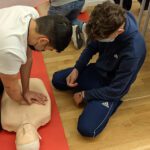When it comes to exam time, it’s almost impossible not to feel stressed. While a small amount can be a good motivator, you don’t want stress to affect your health. Luckily, there are ways you can manage your stress so you can feel more at ease during this time.
Make a plan
Most people thrive on stability which can be achieved by being organised. Most of us are busy juggling work and social commitments, as well as exercise, downtime and sleep. When you add exams to the mix, it’s normal to be stressed and overwhelmed.
To avoid letting that stress take over, jot down all the things you need to do and when. It’s important that you include things that you enjoy as well. Doing this will make you feel more on top of things as you can look at your day at a glance.
Even if you’re someone who doesn’t normally like following a schedule, having a plan during the study and exam periods will help you achieve what you need to while also fitting in well-deserved downtime.
Exercise
Everyone knows that exercising has enormous benefits for your physical health. However, studies have shown that exercising also benefits your mental health and overall brain function.
During intense study periods and, of course, during exams, you need to rely on your mind to remember, focus, and problem-solve. The last thing you need is to have brain fog on the big day or feel unprepared because you weren’t able to study effectively.
Researchers found that regular exercise boosts the area of the brain that controls memory and learning. Physical activity also increases oxygen flow to the brain, which will improve concentration and help you retain information.
Exercising also improves your mood, and if you’re in a good mood, you’re more likely to feel motivated to study and do well.
Nourish your body
Nourishing your body with good, nutritious food is another way you can manage stress and feel more prepared for exams.
High-quality foods contain lots of vitamins, minerals, and antioxidants, which help not only your energy levels but also the way your brain functions. Studies have proven that eating whole foods with good macro and micronutrients helps with memory, mood, and focus – all of which are crucial to studying effectively.
This is not to say there isn’t room for ‘junk’ food because most of us are guilty of reaching for a bag of lollies and a red bull during a late-night study session. However, if sugary and processed foods are what make up most of your diet, then you’ll probably feel sluggish and unmotivated.
Sticking to the 80/20 diet will support your mental well-being and help give you the energy you need to study and think clearly.
Spend time outdoors
Have you noticed that when you actively spend time outside, you feel calm and grounded? Studies have shown that being surrounded by nature relieves stress and anxiety. While these are common feelings to have during exam time, they negatively impact motivation, sleep, mood and other drivers that lead to success.
There are so many ways to spend time outdoors. You can walk, ride your bike, go for a run, or do yoga. There are also so many ways to enjoy time outdoors which don’t involve exercise. These involve things like going to the beach, playing with your pet, watching the sunrise or sunset, and reading.
Even if you spend 20 minutes outdoors appreciating your surroundings, you’re bound to feel more calm and ready to take on your studies.
Sleep
The importance of sleep is something we’re all aware of. However, it’s usually the first thing we sacrifice when studying.
While many current and former students can probably say they’ve pulled an ‘all-nighter’ and got a high mark on their assignment or exam, this is usually a result of poor time management, lack of focus and over-extending themselves with other commitments. The importance of sleep might be understood, but it is certainly overlooked.
Instead of scrolling on your phone for an hour before bed, use that time to properly wind down and avoid more screen time so you can have a better sleep.
While most sources will say seven to eight hours per night is optimal, everyone is different. If you’re someone who feels sharp and alert after six or seven hours, then honour that. Or if you need seven to nine, then go with that.
Take breaks
Exams are a stressful time, and you might feel more prepared by studying for hours on end. However, if you don’t give yourself any breaks, then you will very quickly burn out.
Taking a short break every hour or so will help you retain information better rather than trying to remember everything you’ve read or watched when you’ve been at your desk for the whole day. Try taking five or 10 minutes every hour to get up and stretch, go for a walk around or give your pet a cuddle and then come back to your task.
Another way you can incorporate downtime is by setting aside at least half an hour in the morning and half an hour in the evening and treating it like an appointment. Whether it’s a short walk, reading your favourite book, watching a TV show episode, or meeting a friend for coffee, making time for yourself will make you feel better.



